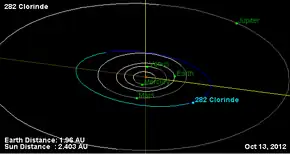 Orbital diagram | |
| Discovery | |
|---|---|
| Discovered by | Auguste Charlois |
| Discovery date | 28 January 1889 |
| Designations | |
| (282) Clorinde | |
| Pronunciation | /klɒˈrɪnd(ə)/ |
Named after | Clorinda |
| A889 BA, 1955 RQ | |
| Main belt | |
| Orbital characteristics[1] | |
| Epoch 31 July 2016 (JD 2457600.5) | |
| Uncertainty parameter 0 | |
| Observation arc | 117.48 yr (42911 d) |
| Aphelion | 2.52817 AU (378.209 Gm) |
| Perihelion | 2.15070 AU (321.740 Gm) |
| 2.33944 AU (349.975 Gm) | |
| Eccentricity | 0.080677 |
| 3.58 yr (1307.0 d) | |
| 277.334° | |
| 0° 16m 31.606s / day | |
| Inclination | 9.03297° |
| 144.972° | |
| 295.960° | |
| Physical characteristics | |
| Dimensions | 39.03±1.0 km |
| 6.42 h (0.268 d) | |
| 0.0502±0.003 | |
| Temperature | unknown |
| 10.91 | |
Clorinde (minor planet designation: 282 Clorinde) is a typical Main belt asteroid.[2] It was discovered by Auguste Charlois on 28 January 1889 in Nice. It was named after Clorinda, the heroine of Torquato Tasso's poem Jerusalem Delivered.
Photometric measurements during 2020–2021 was used to produce a light curve, which shows a rotation period of 49.353±0.004 h with a brightness variation of 0.26 in magnitude. This differs substantially from previous studies.[3]
References
- ↑ "282 Clorinde". JPL Small-Body Database. NASA/Jet Propulsion Laboratory. Retrieved 11 May 2016.
- ↑ "282 Clorinde & UCAC4−520−028079" (PDF). Sendai Uchukan. Retrieved 6 April 2015.
- ↑ Bonamico, Roberto; van Belle, Gerard (July 2021), "Determining the Rotational Period of Main-Belt Asteroid 282 Clorinde", Bulletin of the Minor Planets Section of the Association of Lunar and Planetary Observers, vol. 48, no. 3, p. 210, Bibcode:2021MPBu...48..210B.
External links
- 282 Clorinde at AstDyS-2, Asteroids—Dynamic Site
- 282 Clorinde at the JPL Small-Body Database
This article is issued from Wikipedia. The text is licensed under Creative Commons - Attribution - Sharealike. Additional terms may apply for the media files.